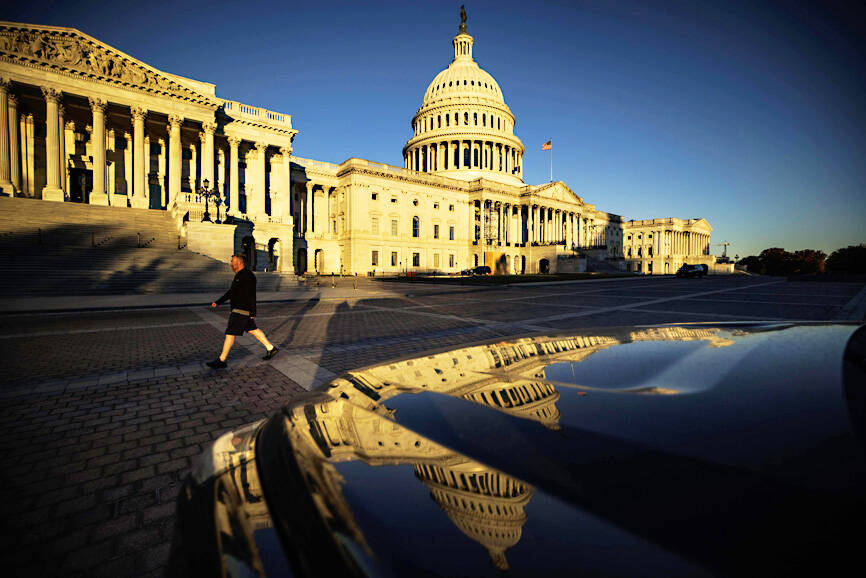The US Congress on Thursday unveiled an annual defense budget bill containing stipulations for establishing a comprehensive training, advising and institutionalized capacity-building program for Taiwan.
The US House and Senate armed services committees proposed the National Defense Authorization Act (NDAA) for the 2024 fiscal year via a reconciliation process.
The draft act is to be deliberated by the two chambers of the US Congress and then handed to US President Joe Biden for approval if passed by lawmakers.

Photo: AFP
The bill stipulates that the comprehensive training, advising and capacity-building program should be established by the US Secretary of Defense with the approval of the Secretary of State in consultation with Taiwanese officials.
The program’s aims include enabling a layered defense by Taiwanese armed forces in support of an asymmetric warfare strategy, encouraging information sharing and improving interoperability between the militaries of Taiwan and the US.
These goals additionally include improving Taiwan’s joint warfare capabilities, and enhancing the nation’s professional military education and civilian control of its military, the draft states.
The act urges the US Department of Defense to train Taiwanese armed forces to make use of transferred defense articles and services, reform and integrate their reserve forces and integrate military forces and civilian capabilities.
Furthermore, the US should facilitate the development of cyberwarfare defense capabilities and practices by Taiwan, and the nation’s participation in bilateral and multilateral military exercises, it says.
The secretary of defense is directed to provide congressional committees with a report on the Taiwanese military’s absorption of capabilities furnished by the US over the past decade, it said, adding that this report is to be made within 90 days of the NDAA’s enactment.
Top US defense and intelligence officials are required to make a report within 180 days of the NDAA’s enactment to the House and Senate’s select intelligence committees on the risks and implications of a sustained military blockade of Taiwan by China, it states.
This report should address the means China could use to realize such a blockade, identify the indicators and warnings of a military blockade and put forward a time line, it says.
The report should additionally address the coercive means China might use in conjunction with a blockade, including the takeover of Taiwan’s outlying islands, the negative impact of the blockade on Taiwan and the US and military challenges posed by it, the draft says.
The report should furnish an assessment of the US armed forces’ capabilities for countering a military blockade of Taiwan, identify areas for improvement and potential use of allies and partners in such an event, it says.

TRAGEDY STRIKES TAIPEI: The suspect died after falling off a building after he threw smoke grenades into Taipei Main Station and went on a killing spree in Zhongshan A 27-year-old suspect allegedly threw smoke grenades in Taipei Main Station and then proceeded to Zhongshan MRT Station in a random killing spree that resulted in the death of the suspect and two other civilians, and seven injured, including one in critical condition, as of press time last night. The suspect, identified as a man surnamed Chang Wen (張文), allegedly began the attack at Taipei Main Station, the Taipei Fire Department said, adding that it received a report at 5:24pm that smoke grenades had been thrown in the station. One man in his 50s was rushed to hospital after a cardiac arrest

SAFETY FIRST: Double the number of police were deployed at the Taipei Marathon, while other cities released plans to bolster public event safety Authorities across Taiwan have stepped up security measures ahead of Christmas and New Year events, following a knife and smoke bomb attack in Taipei on Friday that left four people dead and 11 injured. In a bid to prevent potential copycat incidents, police deployments have been expanded for large gatherings, transport hubs, and other crowded public spaces, according to official statements from police and city authorities. Taipei Mayor Chiang Wan-an (蔣萬安) said the city has “comprehensively raised security readiness” in crowded areas, increased police deployments with armed officers, and intensified patrols during weekends and nighttime hours. For large-scale events, security checkpoints and explosives

A car bomb killed a senior Russian general in southern Moscow yesterday morning, the latest high-profile army figure to be blown up in a blast that came just hours after Russian and Ukrainian delegates held separate talks in Miami on a plan to end the war. Kyiv has not commented on the incident, but Russian investigators said they were probing whether the blast was “linked” to “Ukrainian special forces.” The attack was similar to other assassinations of generals and pro-war figures that have either been claimed, or are widely believed to have been orchestrated, by Ukraine. Russian Lieutenant General Fanil Sarvarov, 56, head

PUBLIC SAFETY: The premier said that security would be tightened in transport hubs, while President Lai commended the public for their bravery The government is to deploy more police, including rapid response units, in crowded public areas to ensure a swift response to any threats, President William Lai (賴清德) said yesterday after a knife attack killed three people and injured 11 in Taipei the previous day. Lai made the remarks following a briefing by the National Police Agency on the progress of the investigation, saying that the attack underscored the importance of cooperation in public security between the central and local governments. The attack unfolded in the early evening on Friday around Taipei Main Station’s M7 exit and later near the Taipei MRT’s Zhongshan